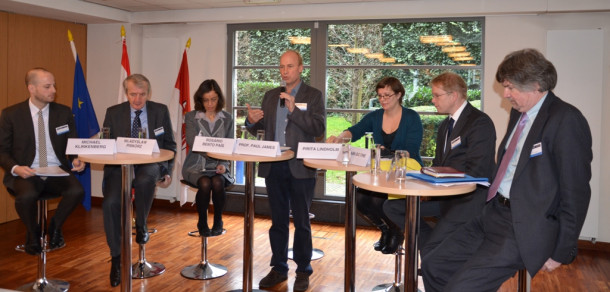
“No Regrets”: agreement of basic principles to face climate change in cities right now
Last Monday, the Metropolis Initiative on Integrated Urban Governance, led by Berlin, organized in Brussels the second dialogue of the series “No Regrets”, which seeks to mobilize cities to adapt to climate change. Recommending actions that must be taken now before it is too late, the initiative took a step further on promoting measures for sustainable development in European cities, which can be replicated further on at Metropolis member cities in other regions as well.
As climate change advances with extreme weather events worlwide, the No regrets measures focus on adaptation strategies, which some European cities are already implementing, rather than on mitigation measures, which rely on a consensus that has not yet been reached in international negotiations – for instance, on how much carbon emissions or the temperature of the planet must be controlled.
Such adaptation strategies, however, do not mean only massive investments in changing infrastructures (e.g. the construction of dams against flooding), but also on simple tools and significant changes promoted at the level of communities and neighborhoods.
One of the basic principles is, “Cities are driving climate change, at the same time they are suffering from climate change”, as Dr. Diego Rybski, from the Potsdam Institute for Climate Research, made clear during his presentation. Therefore, the No regrets measures are drafted by cities for cities, and are deeply focused on the urban context. Its actions range from retrofitting buildings for resource in efficiency to connecting green areas to provide habitats for endemic species, as well as from monitoring vulnerable areas with simple GIS tools to generate local-based production and consumption of goods, among many others.
The representatives of EU institutions expressed in their contributions to the discussion (see photo) that they very much welcomed Metropolis taking the initiative to a No Regrets Charter, especially as it is a very good complement to the various activities the EU performs to strengthen the cities and city-regions’ active roles in sustainable development. The representatives offered further cooperation with the development of the charter and its implementation. They also expressed the expectation that the charter would provide a contribution to the preparation of a European Urban Agenda as well as to adaption strategies being discussed by a group of European cities.
“With No regrets we are trying to set a basic principles agreement to formulate proposals on the cross-cutting spheres of ecology, economics, politics and culture”, explained Paul James, Professor of the University of Western Sydney and Director of the United Nations Global Compact Cities Programme, who moderated the dialogues.
During the afternoon session the conference participants divided into four working groups focusing on the topics of: Political Responsibilities for No Regret Measures, Disaster Management, Spatial Planning and Urban Climate, and Community Engagement, to discuss suggestions to the No Regrets Charter.
Great insight was also provided by representatives of the Belgium Climate Youth, who reinforced the need to implement such actions through bottom-up and participatory approaches, which embody the perspectives of different spheres of society. Particularly important are the youngest populations, who are going to suffer the drastic consequences of climate change in the future.
“If we don’t act now, we will regret it”, concluded Barbara Berninger, Head of European and International Affairs at the Berlin Senate Department for Urban Development and the Environment, and also Regional Secretary of Metropolis for Europe.
After this second round of discussions in Brussels, the core team of this Metropolis Initiative is now working on the final version of the No Regrets Charter, which will be submitted to a round of consultation with participants of the dialogues. The definitive No Regrets Charter will be publicized by mid-April, at the Metropolis website and other communication channels. The charter is intended to be presented, also, at the next Metropolis World Congress in Hyderabad, and through this opportunity win the support of the charter’s goals and principles from as many member-cities as possible to test, advance, and mutually exchange experience of the No regrets measures included in the charter as well as similar concepts and detailed activities of integrated urban governance approaches to climate change adaption.
The preliminary version of the document was drafted after the first No Regrets dialogue and can be downloaded here.
Photo (copyright Birgit Urban): Members at the podium during the EU-Round from left to right:
Additional resources:
- Presentations:

